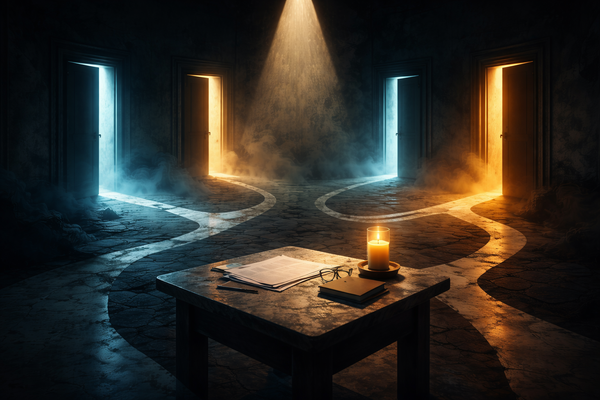Why I’ll Never Be “Over It” (and Don’t Want to Be)
Because closure is for storage units, not people

Every so often, it randomly occurs to me that I am not, and will never be, one of those “move on” people.
If someone’s terrible to me and never even tries to apologize or make things right, I will absolutely still be mad about it twenty years from now. I won't be sitting there seething, necessarily, or thinking about whatever it was 24/7, but I'll definitely be archivally irritated. Whatever crime you committed to inspire that feeling will live in a folder in my mental filing cabinet labeled “You Know What You Did.” Probably forever.
Contrary to what some want to believe, this isn’t something I choose. It’s apparently just the way I’m built. My brain doesn’t understand what it means to delete something. It simply stores everything like some weird emotional cloud drive.
There's good news, though. That whole state of affairs works both ways. If you’ve ever been kind to me or been there for me at a time when I really needed you, I will remember that, too. You could have randomly decided to hand me a cookie during a rough afternoon in 2014, and I can promise you I still remember and smile about it sometimes.
So, I suppose I'm not truly a grudge-holder. I’m more like a historian with a really detailed memory.
Why the World Needs to Calm Down About "Moving On"
As you've probably noticed, there’s an entire industry built around letting go — books, retreats, scented candles, guided meditations where someone whispers “release” over flute music, and all. And to be fair, I've personally tried a lot of it.
It doesn’t work.
Because sometimes you’re just not ready to forgive or forget. Sometimes it's more helpful to simply accept that you’re still mad and let that be OK. People act like closure is this sacred finish line that will magically make you feel better if you can only reach it.
A lot more often, though, it’s just emotional peer pressure. “Get over it” usually means, “Please stop making me uncomfortable with your continued humanity," or sometimes, "Please stop holding people accountable for how they treat you, because it's making life inconvenient for me."
Maybe We Need Context More Than Closure
Forgiveness can be great, and so can forgetting (when it makes sense and actually feels right). But forcing it before you’re ready is like putting a Band-Aid on a bullet hole and calling it “growth.” It's taken me most of my life to really understand that you don’t have to forgive people who haven't earned it.
And you don’t have to erase your feelings to prove to people around you that you’ve healed. It's a good idea to make it so heavy feelings are no longer taking up prime mental real estate, though. Move them from “front of house” to “back storage.” They're definitely still back there. They're just not visible every day, and that's really for the best.
I’ve learned that “being over it” is overrated. What actually helps is learning to live alongside the thornier parts of your history without letting it run the show.
Advice for Fellow Long-Memoried Souls
So how does a person survive being someone who remembers everything, without turning into either a bitter crypt keeper or a walking Hallmark card? Allow me to offer a few suggestions.
You don't have to forgive everyone
Seriously. Some people just plain suck, and pretending they don’t is just straight-up denial.
The forgiveness police aren't going to come to your house and arrest you because you decided you'd rather not turn the other cheek for some asshole. Forgiveness is always optional. If you do it, do it for your peace, not the other person's comfort. It's definitely possible to move on from the situation without absolving the person.
Forgiveness is a little bit like expensive skincare that way — nice if it works for you, but definitely not mandatory or right for everyone.
You don't have to forget, either
Forgetting isn't necessarily proof that you’ve healed. It could just as easily mean you’ve deleted useful data you'll need again someday. Remembering helps you set better boundaries next time.
That said, you don’t have to keep rewatching the movie version of your trauma, but you also don’t have to pretend it never premiered. Acknowledge that it happened, learn what you can from it, and do what you can to prevent a sequel.
Anger isn't poison but a message
Anger gets a really bad rap that I'm not entirely sure it deserves. Everyone wants you to “release” it, but honestly, anger’s the reason half of us finally started therapy, or left a bad situation, or got up one day and demanded better for ourselves. It’s protective. It's the part of us that isn't afraid to say, “Hey, that wasn’t okay.”
So, yeah, you don't have to suppress your anger or deny its existence. Just don’t feed it fast food and give it a permanent rent-free room in your head. Let it drop by, say its piece, then show itself out politely.
Don't forget the good stuff
If you’re going to hold grudges, hold gratitude when it's warranted, too. Remember who was kind and who showed up. Remember who brought you soup when you were too proud (or maybe just too sick) to ask.
Balancing the emotional spreadsheet keeps you from turning into a cynic. You can be realistic without being joyless.
Don't confuse peace with amnesia
Sometimes being “over it” just means you’ve gone completely numb, which is hardly a positive thing. True peace feels quieter. It’s what you're left with when you can remember what happened without wanting to throw a shoe at the other person's face.
And it’s okay if you’re not there yet. Healing doesn’t happen on a schedule, and not everyone deserves to be forgiven anyway.
I used to let people make me feel like I’d failed some monumental emotional test because I couldn’t let certain things go. Now I realize I just process life differently from other people. Maybe even more thoroughly. Some people skim. I annotate.
I still think about unsettling things from a decade ago in a “wow, that really happened” way. It’s part of my inner landscape now. And I’ll never be “over it," because I’m not built for clean emotional slates. I am built for continuity, memory, and the occasional petty internal monologue.
And honestly? I like it that way. Because people who remember deeply also love deeply, and that’s not something I’d ever want to get over.





